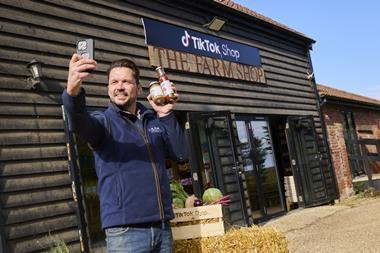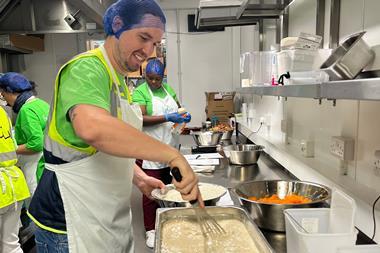If you're a small supplier seeking advice on forging links with retailers, you'd be forgiven for feeling confused about the plethora of local food groups keen to offer their services.
No one knows the exact figure but there are scores of local and regional groups providing marketing support, showcasing products, advising and training. Despite their willingness to help, many know little of what their contemporaries are up to and where their activities overlap.
Food from Britain works with 17 representative organisations across the UK. It coordinates and works with seven groups in England and its national promotional role on behalf of the regional foods sector includes partnerships with representative organisations in Scotland, Wales and Northern Ireland.
FFB's director of business and UK services Charlotte Lawson admits: "There is a lot of duplication because there is a huge number of organisations." It's an issue which Sir Don Curry highlighted in the Policy Commission's report on the Future of Farming and Food. He believes that parliamentary devolution is complicating the situation."There is a risk that as we fragment, our ability to deliver a single, clear message which consumers understand, trust and believe will be deflected."
This need for co-ordination is reflected by DEFRA which says it is studying how regional and local food groups should be co-ordinated. Its conclusions are due to form part of the response to the Curry report in the next couple of months. And it is likely that the department will seek greater co-operation between regional and local food groups and for regional development agencies and the Countryside Agency to work with food groups to encourage rural producers.
Peter Simpson, manager of the Countryside Agency's Eat The View project, is one of those calling for more cohesion. He says: "We want to see the strategy of local and regional food players co-ordinated and developed." Paul Knuckle is head of the Soil Association's Local Food Links department, formed to maintain relationships with 30 UK local Food Links groups set up to work with the government, local authorities, and community organisations, and similar to FFB's county-based food groups.
Knuckle says: "There needs to be clarity over the individual roles of the FFB and the Food Links groups." He suggests an alliance is the way forward, but a stumbling block seems to be the definition of local'.
FFB developed a working definition of local' and similar terms, based on a survey of manufacturers. Regional, it said, should be interchangable with specialist' to mean high quality products occupying niche markets at premium prices. The FFB's Lawson admits: "There is a great deal of confusion over terms such as regional' or locality'. More work is needed to determine what we mean by locality' foods so we're all clear about the parameters and scope of our activities."
FFB regional food groups link producers with retailers, helping them understand each other's requirements.
Lawson adds: "Our work focuses on trade development, linking producers with retailers and on promotion and marketing support for manufacturers. FFB groups run a database of retail buyers and subsidise training for producers. And they provide manufacturers with marketing advice, helping them showcase their talents through trade shows and promotions."
One such promotion, A Taste of The Nation, began last month in partnership with Selfridges department store which will be displaying products from different regions each month until December.
FFB also promotes UK produce overseas but Lawson argues this does not mean it offers less help to smaller UK suppliers. However other groups claim they better represent the interests of the smallest local producers. One of these is F3, the Foundation for Local Food Initiatives. Its director Charles Couzens says: "There is a problem with regional food groups because of their emphasis on exports. Another is that smaller groups cannot receive FFB funding unless they are FFB members and the expensive fees put them off. We are talking to small producers and processors, farm shops, and farmers' market stallholders."
F3 focuses on local economies, the environment and the community. It offers producers advice on marketing, business plans and funding applications. It helped to set up projects such as the Food Links network whose groups are managed on a lower level by regional bodies such as the South West Local Food Partnership.
Paul Sander-Jackson, project manager for Somerset Food Links and director of the South West Local Food Partnership, explains: "The partnership facilitates the sharing of best practice. We act as a learning exchange and an advocate for Food Links groups to the regional development agencies.
"Our role complements FFB. We'd like to see the proportion of foods promoted and sold locally increased, but it would be naive to confine local' too much."
The Soil Association also had a hand in setting up Food Links groups. Joy Carey is network development officer for the Soil Association's Local Food Works project, an initiative launched this week building links between local producers, caterers, retailers and community groups. She says Food Links groups place more focus on local markets than FFB. She also believes they are more concerned with primary producers, such as fruit and vegetable suppliers, rather than FFB, which promotes speciality and premium products.
Besides FFB, F3 and Food Links, smaller independent groups still continue to pop up, serving local manufacturers and retailers. With so many groups around, it's clear that a large chunk of cash is needed to keep them all going and if that's not available, some of them could bite the dust.
The government agreed to give each FFB group £12,000 a year for five years after their launch so they could become self-supporting. But as the last group to be formed Heart of England Fine Foods nears the end of its five-year start-up, the groups now say their work will be hampered without guaranteed long-term funding.
FFB itself is helped by DEFRA grants and some of this cash is relayed to its regional groups. DEFRA says funding of the groups is being complicated by the fact that the EU Commission is questioning the compatability of funding with state aid rules. To complicate matters further, groups are also funded by Defra's England Rural Development programme and its Rural Enterprise Scheme for sustainable rural economies. Alternative sources of cash can also come from local authorities or groups such as the Small Business Service and public sector bodies such as Trade Partners UK.
Heart of England Fine Foods chief executive Karen Davies insists that funding on an annual basis is not viable. "We don't need to be spending 80% of our time facing funding problems." She points out that working on a project basis means employing someone who gets to know producers. "Then in 18 months or two years, you might have to let them go because you can no longer fund them," she says.
And Somerset Food Links' Sander-Jackson condemns the system as too clumsy and inefficient. "Regimes are too complex and inaccessible to small scale producers. Money is likely to take six months to reach groups."
FFB's Lawson points out that planning ahead is proving very difficult. " We have requested proper, long-term funding from Tony Blair. And we have costed out a proposal. What I hope will be a larger tranche of government funding will not become available until 2003 but, hopefully, it's in the pipeline."
Retailers and other producers recognise that food groups play an important role in the food chain. But unless the myriad individual groups are more clearly defined, co-ordination is clarified and funding is long-term and tailored, their role could be jeopardised.
The government appears keen to prevent that. Food and farming minister Lord Whitty last month promised the function and remit of FFB groups would form part of the response to the Curry report. "The role of FFB, regional food and drink suppliers and high quality speciality food and drink producers will be in lights, I can assure you," he said. This "assurance" is being kept front of mind by all involved, for the potential of the Curry report should not be underestimated: the future of the UK food industry cannot be separated from the work food groups do to unite the chain and spur on sustainable local sourcing. n
{{FEATURES }}
Close menu
- Home
- Retail & Wholesale
-
Products & Suppliers
- Back to parent navigation item
- Products & Suppliers
-
Product Categories:
- Back to parent navigation item
- Product Categories:
- Alcoholic drinks
- Bakery
- Cereals & breakfast
- Cheese
- Chicken & poultry
- Chocolate
- Confectionery
- Crisps, nuts & snacks
- Dairy
- Fish
- Fresh produce
- Frozen
- Household
- Meat
- Own Label
- Sauces & condiments
- Seasonal
- Soft drinks
- Vaping
- Vegan & plant-based
- World foods
- Suppliers
- People
- Reports & Data
-
Topics A-Z
- Back to parent navigation item
- Topics A-Z
-
Popular topics:
- Back to parent navigation item
- Popular topics:
- Cost of living crisis
- Crime
- Deposit Return Schemes
- Finance
- Government & Regulation
- Health
- Inflation
- Loyalty
- Marketing
- Mergers & Acquisitions
- New Product Development
- Sourcing
- Supply chain
- Sustainability & environment
- Technology
- Ultra Processed Foods
- Vaping
- A-Z all topics
- Content by type:
- Events
- Ask iA (beta)
- Subscribe now
Sign in to comment on this article
Not logged in before? Register for FREE guest access today.
You will be able to:
- Read more stories
- Receive daily newsletters
- Comment on stories
Advert













No comments yet